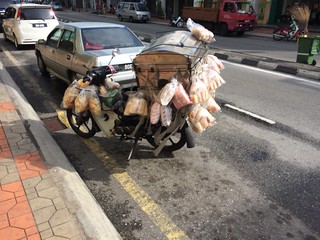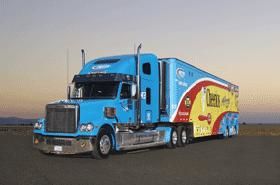On-Duty Downtime Question For The OTR Reefer Tuggers
Topic 6608 | Page 1
There is no difference to how you log On-Duty between a Dry Van and Reefer.
On-Duty must be used for Pre-Trip/Post-Trip, arrival and departure of customers, fueling, DOT inspections.
So basically, the freight you pull doesn't mean you do your logbook differently.
Logbook:
A written or electronic record of a driver's duty status which must be maintained at all times. The driver records the amount of time spent driving, on-duty not driving, in the sleeper berth, or off duty. The enforcement of the Hours Of Service Rules (HOS) are based upon the entries put in a driver's logbook.
DOT:
Department Of Transportation
A department of the federal executive branch responsible for the national highways and for railroad and airline safety. It also manages Amtrak, the national railroad system, and the Coast Guard.
State and Federal DOT Officers are responsible for commercial vehicle enforcement. "The truck police" you could call them.
Dry Van:
A trailer or truck that that requires no special attention, such as refrigeration, that hauls regular palletted, boxed, or floor-loaded freight. The most common type of trailer in trucking.Reefer:
A refrigerated trailer.

Can't say what it is like now but it depends a lot on what you haul and where you haul it. If you get frozen food out of someone like Con-Agra you will normally get loaded pretty fast. But then you may end up waiting for a specific dock time to unload at the other end or with 5 different stops. From what I understand drivers don't have to "fingerprint" loads like we used to so that may be different now. It also used to be that the dock foreman often got a kickback from the lumpers and if you didn't hire the right crew or wanted to do it yourself you could set for hours and or days! Meat ships mostly in boxes these day and not as much swinging but meat has to "cool" for 3 days before it can be put on the shelves or cut up so the shippers and receivers used to count trailer time as part of that cooling time. So if you got to Miami in two days out of Iowa then you would set a third day while they used your reefer fuel to cool it. Then going back north you'd get corn out of the Okeechobee area. Corn had to be iced and the you couldn't run the reefer unit. And or course sometimes split loads where you had to control the temp with the reefer in front and ice the corn in back. Also trucking companies used to buy loads of bananas off the central American boats and when you were loaded they would try to sell the. "Head north and call me from Atlanta"! LOL Typical dispatcher statement on "roller" loads. Named because they would roll you north till they had your load sold or it rotted! Not unusual with bananas.
I made a lot of money with reefers but after spending time on flatbeds and tankers I wouldn't pull one of the damn things across the street!

Shipper:
The customer who is shipping the freight. This is where the driver will pick up a load and then deliver it to the receiver or consignee.
Dispatcher:
Dispatcher, Fleet Manager, Driver Manager
The primary person a driver communicates with at his/her company. A dispatcher can play many roles, depending on the company's structure. Dispatchers may assign freight, file requests for home time, relay messages between the driver and management, inform customer service of any delays, change appointment times, and report information to the load planners.Reefer:
A refrigerated trailer.
Thanks Daniel, maybe I wasn't very clear with my question. From reading your and others posts about pulling Reefer , it appears that there is far less drop and hook loads than pulling dry van , so I'm wondering just how much time more downtime I would expect to be sitting waiting on shippers/receivers, etc vs pulling dry van? 2 hours, 6 hours, 10 hours average per week difference?
From reading your posts, I know that you talk a lot about maximizing your clock and try to do as much of the downtime as possible while off duty, and I appreciate everything you say about how you go about getting the most 'bang for the buck' so to speak from your HOS clocks.
Perhaps a better way to re-phrase my question would be to simply as how much time per week on average does your truck sit bumped up on a loading dock each week? My follow up question would then be how much of that dock time do you get stuck logging as on-duty time for one reason or another?
Shipper:
The customer who is shipping the freight. This is where the driver will pick up a load and then deliver it to the receiver or consignee.
Dry Van:
A trailer or truck that that requires no special attention, such as refrigeration, that hauls regular palletted, boxed, or floor-loaded freight. The most common type of trailer in trucking.Reefer:
A refrigerated trailer.
Drop And Hook:
Drop and hook means the driver will drop one trailer and hook to another one.
In order to speed up the pickup and delivery process a driver may be instructed to drop their empty trailer and hook to one that is already loaded, or drop their loaded trailer and hook to one that is already empty. That way the driver will not have to wait for a trailer to be loaded or unloaded.
HOS:
Hours Of Service
HOS refers to the logbook hours of service regulations.Wow Leslie! Talk about information overload! LOL Thanks for the very detailed response :)
Sounds like you spent a bit of time pulling Reefers during your career.
Reefer:
A refrigerated trailer.
Well, for me I don't feel like there's a big difference in wait times because it seems most of my loads are extremely tight scheduled. But as a new driver you won't get great loads repeatedly. It's tough to give you an exact number, it really depends on the location and facility. One week you could be pulling loads that don't take much time and the next week you could be dealing with nothing but Walmart.
The thing is, reefer loads are typically a longer haul. So while we may be waiting at our destinations, we do get to spend extra time driving those miles. And with dry van , you could be in and out quickly but you might have to deal with a customer per day.
So honestly, there's no number I can give you because there's just a million varaiables that come into play and these weeks are just so inconsistent. There's more wait time with reefer though, that can't be contested.
Honestly though, if I had the option to keep my exact job but pull a dry van instead I would gladly replace my trailer with a dry can. It's not so much the drop and hooks, it's also managing that extra fuel tank and topping it off before any drop. That can get seriously annoying.
All in all, I would do what you feel like doing. The difference isn't huge and there's still plenty of money to be made pulling a reefer - you know this after seeing my paycheck. Do what you feel like doing and don't pay too much attention to the small details.
Dry Van:
A trailer or truck that that requires no special attention, such as refrigeration, that hauls regular palletted, boxed, or floor-loaded freight. The most common type of trailer in trucking.Reefer:
A refrigerated trailer.
Drop And Hook:
Drop and hook means the driver will drop one trailer and hook to another one.
In order to speed up the pickup and delivery process a driver may be instructed to drop their empty trailer and hook to one that is already loaded, or drop their loaded trailer and hook to one that is already empty. That way the driver will not have to wait for a trailer to be loaded or unloaded.
HOS:
Hours Of Service
HOS refers to the logbook hours of service regulations.Also, you don't ever leave yourself On-Duty while waiting at a dock. There's no easier and faster way to burn your 70 hour clock.
Give some On-Duty at arrival and departure and the rest on Sleeper Berth. But don't log three hours On-Duty because you were getting loaded for three hours.
Sleeper Berth:
The portion of the tractor behind the seats which acts as the "living space" for the driver. It generally contains a bed (or bunk beds), cabinets, lights, temperature control knobs, and 12 volt plugs for power.

I drove reefer mostly when I first started out. Now I haul tires.
With experiencing both types of loads I can easily tell you I will never pull a reefer ever again. They are just that much of a pain.
Reefer:
A refrigerated trailer.
Also, you don't ever leave yourself On-Duty while waiting at a dock. There's no easier and faster way to burn your 70 hour clock.
Give some On-Duty at arrival and departure and the rest on Sleeper Berth. But don't log three hours On-Duty because you were getting loaded for three hours.
OK, so that makes sense! If I understand correctly, even though it counts against your 14-Hour clock, log it as SB or Off Duty so it does not count against your 70... good stuff, I hadn't considered it that way.
Sleeper Berth:
The portion of the tractor behind the seats which acts as the "living space" for the driver. It generally contains a bed (or bunk beds), cabinets, lights, temperature control knobs, and 12 volt plugs for power.
By the way... also thanks for the detailed responses on dock time, etc! :) I knew it would be varied and unpredictable from one week to the next, so I really only wanted perhaps a range of averages over a period of time. As you say, it is varied and unpredictable, so even asking for averages is not likely to give a good indication on what to expect if I went the Reefer route for a carrier.
Reefer:
A refrigerated trailer.
New Reply:
New! Check out our help videos for a better understanding of our forum features

















Preview:








 TT On Facebook
TT On Facebook
From reading the many posts on TT, I see that there is a lot of time spent waiting for appointments, live loads and live unloads, etc when pulling a reefer unit. I'm curious how much time is spent on say a weekly basis on-duty waiting for these types of things to be done vs say pulling a dry van?
Dry Van:
A trailer or truck that that requires no special attention, such as refrigeration, that hauls regular palletted, boxed, or floor-loaded freight. The most common type of trailer in trucking.Reefer:
A refrigerated trailer.